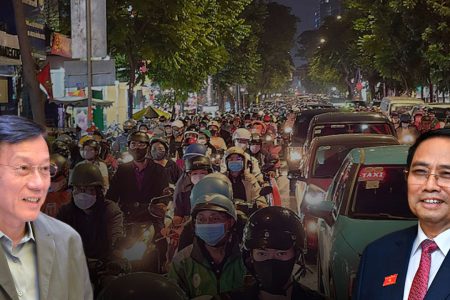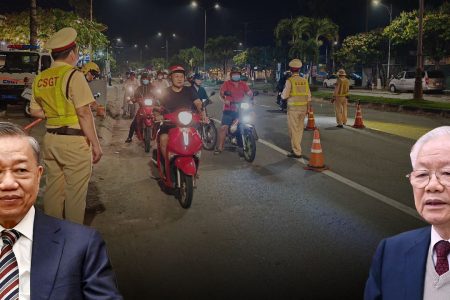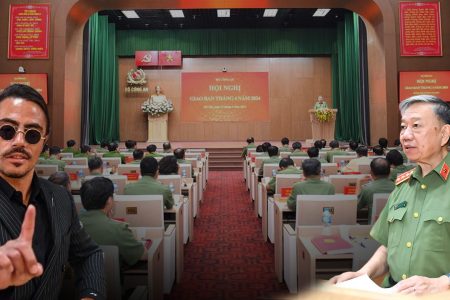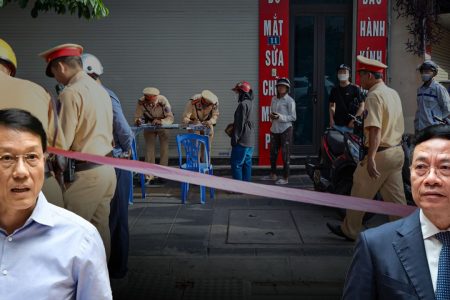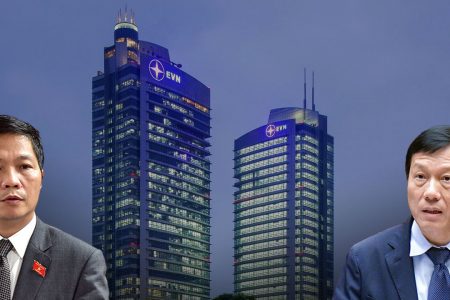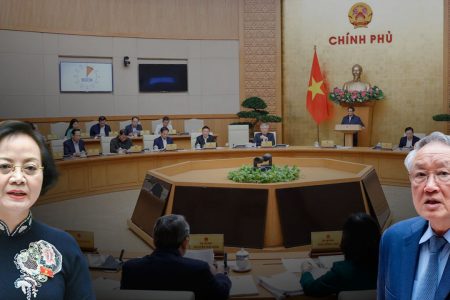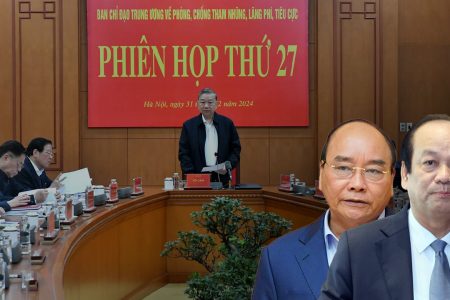
Defend the Defenders, Press Release, October 2, 2020
For immediate release
According to Defend the Defenders’ statistics, as of September 30, 2020, Vietnam’s communist regime is holding at least 258 prisoners of conscience in prisons or other forms of detention. The number does not include Ngo Hao (m) whose sentence is currently suspended for medical treatment, and two pro-democracy activists Nguyen Trung Linh (m) and Le Anh Hung (m) who are forcibly committed in mental hospitals without judicial process. The list includes female activist Huynh Thuc Vy who has been convicted and sentenced but is held under house arrest in the maternal period, American citizen Michael Minh Phuong Nguyen (m) convicted of conducting “attempts to overthrow the government” under Article 109 of the country’s 2015 Criminal Code, and Australian citizen Chau Van Kham (m) found guilty of terrorism under Article 113 of the code.
The number does not include 15 land petitioners from Dong Tam commune who were arrested on January 9 this year during the police raid in the locality and convicted of “resisting on-duty state officials” by the first-instance hearing on September 7-14 but given probation sentences.
Twenty-eight of the prisoners of conscience identified by Defend the Defenders are women human rights defenders (WHRDs).

In total, 188 people, or 72.8% of the list, are ethnic Kinh. The second-largest ethnic grouping on the list is Montagnards, a loose set of religious and ethnic minorities who live in the mountains of the Central Highlands. They account for 62 people or 24% of those on the list. Six from Hmong and two on the list are Khmer Krom.
Bloggers, lawyers, unionists, land rights activists, political dissidents, and followers of non-registered minority religions have been arrested and detained for peacefully exercising their internationally and constitutionally protected rights, principally the right to freedoms of expression, peaceful assembly, and religion or belief. The list does not include individuals who have engaged in or advocated violence.
Vietnam still holds 28 activists in pre-trial detention, seven of them were arrested in 2018-2019 and the remaining 21 were arrested in 2020. Among them is prominent independent journalist Pham Chi Dung (m), who is the president of the unregistered Independent Journalists Association of Vietnam (IJAVN) and its Vice President Nguyen Tuong Thuy (m) and well-known political blogger Pham Chi Thanh (aka Pham Thanh- m).
The above includes 230 who have been convicted – mostly of political crimes under Articles 79, 87 and 88 of the1999 Penal Code or Article 109, 117 and 331 in the 2015 Criminal Code. The total number includes:
– 49 activists convicted or charged with subversion (Article 79 of 1999 Penal Code or Article 109 in the 2015 Criminal Code);
– 48 activists convicted and five charged with anti-state propaganda (Article 88 of the 1999 Penal Code or Article 117 of the 2015 Criminal Code);
– 56 people from ethnic minorities were convicted of undermining the national unity policy (Article 87 of the 1999 Penal Code or 116 of the 2015 Criminal Code);
– 16 activists were convicted or charged with “abusing democratic freedom” (Article 258 of the 1999 Penal Code or Article 331 of the 2015 Criminal Code);
– 13 activists were convicted or charged with “disruption of security” under Article 118 of the 2015 Criminal Code;
– 45 individuals were convicted of or charged with “disrupting public orders” (under Article 245 of the 1999 Penal Code or Article 318 of the 2015 Criminal Code) for their peaceful activities. Thirty-three of them were imprisoned for participating or being suspected of planning to participate in the mass demonstrations in mid-June 2018 and their aftermath;
– Three activists Chau Van Kham (male, Vietnamese Australian), Nguyen Van Vien (m), and Tran Van Quyen (m) were convicted of “terrorism” under Article 113 of the 2015 Criminal Code.
– The charges for 13 individuals are unknown, including three Montagaards followers of the Ha Mon sect arrested on March 19 this year.

Background
In order to ensure “stable society” for the ruling Communist Party of Vietnam (CPV) to carry out local party congresses and prepare for its 13th National Congress scheduled for January 2021, the communist regime has tightened control over the nation, intensifying its crackdown on local political dissidents, government critics, social activists, and human rights defenders.
The crackdown continues before and after the European Parliament ratified the EU-Vietnam Free Trade Agreement (EVFTA) in late March and it is expected to be more fierce in the remaining three months of this year.
As the US, the EU and other countries are focusing on their own problems caused by the Covid-19 pandemic and the US Presidential Election on November 3, Vietnam’s communist regime seems to use the opportunity to intensify its crackdown on local dissent without being criticized by the international community. The persecution has peaked in recent months with the arrests of a dozen of activists who have been charged with controversial articles of the national security provisions in Criminal Code.
Arrest in July-September 2020
Between July 1 and September 30, Vietnam arrested four activists. Former journalist Tran Thi Tuyet Dieu of the state-controlled newspaper Phu Yen was arrested on August 21 and charged with “conducting anti-state propaganda” under Article 117 of the Criminal Code while land petitioner Le Van Hai, Nghe An province-based citizen Nguyen Quang Vinh and officer Quach Duy of Ho Chi Minh City People’s Committee Office were arrested and charged with “abusing democratic freedom” under Article 331 of the same code. Their arrests were based on their posts on Facebook regarding issues such as systemic corruption, widespread environmental pollution, bad government socio-economic management, and Vietnam’s weak response to China’s violations of the country’s sovereignty in the East Sea (South China Sea).
Since the beginning of 2020, the communist regime has arrested 24 activists and 29 Dong Tam land petitioners. As many as 13 activists were charged with “conducting anti-state propaganda” under Article 117 of the Criminal Code for their writings and giving interviews to foreign media as well as reporting human rights violations to foreign diplomats.
Among detainees are two members of the unregistered professional group Independent Journalists Association of Vietnam (IJAVN) Vice President Nguyen Tuong Thuy (m) and Le Huu Minh Tuan (m), well-known blogger Pham Chi Thanh (penname Pham Thanh), as well as environmentalist Dinh Thi Thu Thuy (f) from the Mekong Delta province of Hau Giang. Mr. Thuy, 68, and Mr. Tuan, 31, are being investigated in the same case of “conducting anti-state propaganda” with IJAVN’s President Pham Chi Dung (m), who was arrested in November last year. Pham Chi Dung’s arrest was in part reprisal for his advocacy with the European Union to postpone the EU-Vietnam Free Trade Agreement.
In late September, police from the Central Highlands province of Dak Lak kidnapped HCM City-based Pham Dinh Quy, a lecturer of Ton Duc Thang University, and Hoang Minh Tuan, a teacher at Le Thanh Ton High School in the central city of Nha Trang, and deported them to their headquarters in Buon Ma Thuot city for interrogation regarding their denunciation against Secretary Bui Van Cuong of the Dak Lak Party Committee for plagiarism while making his PhD dissertation. The two were held incommunicado and may be investigated for “slander” as the Dak Lak province police criminalized a civil dispute between the two detainees and Secretary Cuong, who is a member of the party’s Central Committee and a candidate for the minister of Information and Communication for the next term.

Convictions in July-September 2020
During this period, the communist regime held three separate first-instance hearings against eight members of the unregistered group Hiến Pháp (Constitution), 29 Dong Tam land petitioners, and pro-democracy activist Nguyen Quoc Duc Vuong.
On July 31, the People’s Court of Ho Chi Minh City convicted eight members of Hiến Pháp named Nguyen Thi Ngoc Hanh (f), Hoang Thi Thu Vang (f), Ngo Van Dung (m), Doan Thi Hong (f), Tran Thanh Phuong (m), Le Quy Loc (m), Do The Hoa (m) and Ho Van Cuong (m) who were arrested in early September 2018 and charged with “disruption of security” under Article 118 of the Penal Code in reprisal of their active participation in the mass demonstration in Ho Chi Minh City on June 10, 2018, in which tens of thousands of people rallied to protest two bills on Special Economic Zones and Cyber Security. During the short trial which failed to meet international standards for a fair trial, the activists were sentenced to between 30 months to eight years in prison and two to three years of probation. Four activists Ngo Van Dung, Le Quy Loc, Ho Van Cuong, and Nguyen Thi Ngoc Hanh have appealed the court’s judgment while the remaining four activists accepted and were transferred to Bo La Prison camp.
On September 7, the People’s Court of Hanoi started the trial against 29 Dong Tam land petitioners, six of them were accused of “murder” for the unverified deaths of three police officers during the bloody attack in the commune on January 9, and the remaining 23 were charged with “resisting on-duty state officials.” The trial, scheduled to last ten working days, was wrapped up on September 14 as the judge decide to impose the death penalty for Le Dinh Cong and Le Dinh Chuc, sons of elderly communal leader Le Dinh Kinh, a victim of an extrajudicial killing by police, and life imprisonment for his grandson Le Dinh Danh. Three others were given between 12 years and 16 years in prison while eight others were sentenced to between three years and six years in prison. As many as 15 others were given probation of between 15 months and five years of probation. The trial was unfair with a number of violations of the Criminal Procedure Code by the judges, the Hanoi People’s Procuracy, and the city Police Department. The European Union, the UK government, and a number of international human rights groups such as Human Rights Watch and Amnesty International have condemned the court judgment. Defend the Defenders and the California-based organization Vietnam Human Rights Network have also issued a joint statement calling on the Vietnamese government to free all the 29 Dong Tam land petitioners and drop the charges against them as well as conduct an impartial and fair investigation to bring those responsible for the raid and killing of Mr. Kinh to court.
On July 7, the People’s Court of the Central Highlands province of Lam Dong convicted local Facebooker Nguyen Quoc Duc Vuong of “conducting anti-state propaganda” and sentenced him to eight years in prison and three years of probation.
In January-September, the Vietnamese communist regime has sentenced 15 activists to between nine months and eight years in prison and 14 land petitioners from Dong Tam commune. Among convicted activists, Nguyen Van Nghiem (m) and Phan Cong Hai (m) were sentenced to six and five years in prison respectively for “conducting anti-state propaganda” for their Facebook posts while Chung Hoang Chuong (m) and Ma Phung Ngoc Phu (f) were sentenced to 18 months and nine months in jail after being convicted of “abusing democratic freedom” under Article 331 also for their Facebook postings. The remaining two convicted are Dang Thi Hue (m) and Bui Manh Tien (m) for their anti-corruption efforts against the illegal collection of road fees by BOT toll-booth facilities which are likely supported by senior officials of the regime. The duo was sentenced to 42 and 15 months in prison by the People’s Court of Son Son district in early May.
The Higher People’s Court in Hanoi has upheld on appeal the sentences of 11 years in prison and five years of probation given to human rights defender Nguyen Nang Tinh (m) on the charge of “conducting anti-state propaganda” by the People’s Court of Nghe An province in the first-instance hearing in mid-November last year.
Mistreatment in prison
Vietnam’s Ministry of Public Security continues its policy to keep prisoners, especially prisoners of conscience, under hard living conditions in a bid to punish them for their non-violent activities but harmful for the communist regime and break their mental strength. Along with sending prisoners of conscience to prisons far from their families, it allows authorities in prisons to apply other psychological measures to make the life of jailed activists harder, such as denying them their rights to regular meetings with their families and receiving additional food and medicines from their relatives, or forcing them to work hard without proper protective equipment. It also puts added psychological and financial trauma on the family members.
In mid-April, police reportedly assaulted prisoners of conscience Ngo Van Dung (m) and Le Quy Loc (m), who were kept in Phan Dang Luu temporary detention facility under the authority of Ho Chi Minh City Police Department. Due to the severe injuries caused by the attacks, the two were hospitalized for treatment for a week. After that, Mr. Loc was returned to the facility while Mr. Dung was transferred to Chi Hoa temporary detention facility also under the authority of the city’s police.
In early January, authorities in Ba Sao Prison camp in the northern province of Ha Nam held Phan Kim Khanh (m) and Nguyen Viet Dung (m) in solitary confinement cells for weeks in revenge for their protest against inhumane treatment in prison. The United Nations Human Rights Council and Special Rapporteur on Torture hold that prolonged solitary confinement can constitute torture.
Detained activist Doan Thi Hong (f) told her family that she was held in severe living conditions in a temporary detention facility under the authority of Ho Chi Minh City’s Police Department during the investigation period as well as during pre-trial detention. Hong, a single mother, was arrested in early September 2018 when her daughter was less than three years old, was charged with “disruption of security”, and faces imprisonment of between three and seven years if she is convicted.
Authorities in Xuan Loc Prison camp continue to hold prisoners of conscience Nguyen Van Duc Do and Huynh Duc Thanh Binh in an isolated area for disciplined prisoners from May as the additional punishment after they requested outdoor privileges during weekends. Their families are permitted to conduct prison visits once every two months compared with one visit and one food supply every month for those who are not disciplined by the prison’s authorities. People held in a disciplined area are not allowed to meet with criminal and political prisoners. Mr. Do’s family reported that authorities in Xuan Loc prison camp in the southern province of Dong Nai have beaten him and served him food mixed with human waste.
In March-August, as COVID-19 was spreading across the nation, authorities in Vietnam’s prison camps and temporary detention facilities did not allow the families and relatives of prisoners of conscience to meet them or provide them with additional food and medicine, as well as other essential items. Given the low-quality of food, health and hygiene concerns in prisons, the lives of prisoners of conscience are often under serious threat.
Along with persecuting prisoners of conscience, authorities in some localities also harass their families. After arresting former prisoner of conscience Can Thi Theu and her two sons Trinh Ba Phuong and Trinh Ba Tu on a charge of “conducting anti-state propaganda” in late June, police in Hanoi and Hoa Binh continuously intimidate her family, summoning her husband Trinh Ba Khiem who is also a former prisoner of conscience and Mr. Phuong’s wife Do Thi Thu to police stations for interrogating about the detainees’ activities.
Release from prison in July-September
In late June, blogger Ho Hai was released after four years in prison. In 2016, he was arrested and charged with “conducting anti-state propaganda” for his Facebook posts. We did not aware of his release so we did not report his imprisonment completion in our mid-year report.
In July-September, there are five have been released or due to complete their imprisonment. On September 18, Protestant pastor A Dao has released after four years of imprisonment thanks to the call from the US Commission for International Religious Freedom and some American Congressmen. He was arrested in August 2016 and sentenced to five years in prison after participating in a regional religious conference in East Timor.
In early July, Le Minh The (m), a member of the Hiến Pháp group, was freed three months before his two-year imprisonment was set to end in October. He was arrested on October 10, 2018, and charged with “abusing democratic freedom,” also for his Facebook post. His imprisonment was shortened by three months.
Doan Khanh Vinh Quang (m), who was arrested on June 10, 2018, on the allegation of “abusing democratic freedom” and later sentenced to 27 months in prison. He was expected to be released on September 10 this year,
Three activists, Dang Van Tuan (m), Le Trong Nghia (m), and Tran Quang Khai (m), who was convicted of “disturbing public orders” and sentenced to 18 months and 27 months in prison, were also expected to be freed in September.
So far this year, 23 prisoners of conscience have been released or are expected to complete their imprisonments. Defend the Defenders has no information which would confirm the release of 15 activists. However, Defend the Defenders still excludes their names from this list.
In late February, Christian Montagnard Y Ngun Knul (m) was released after spending the last 16 years in prison. He was arrested in 2004 and later sentenced to 18 years in prison on the charge of “undermining the unity policy.” He had a number of health problems as a result of long inhumane treatment in different prisons and died a few months after being released.
Defend the Defenders is concerned that authorities in Hanoi are keeping two activists Nguyen Trung Linh and Le Anh Hung in a local mental facility after investigating them on the respective allegations of “conducting anti-state propaganda” and “abusing democratic freedom” without any judicial process. The two activists were subjected to forced medication, which can constitute torture under international law.
=============
The term “prisoner of conscience” (POC) was coined by Peter Benenson in the 1960s. It refers to any individual “imprisoned for his/her political, religious or conscientiously held beliefs, ethnic origin, sex, color, language, national or social origin, economic status, birth, sexual orientation or another status who have not used violence or advocated violence or hatred.”
Defend the Defenders is Vietnam’s independent non-profit organization working to promote human and civil rights in the Southeast Asian nation. It has a network of dozens of human rights defenders across the nation who report human rights abuse in their areas.







